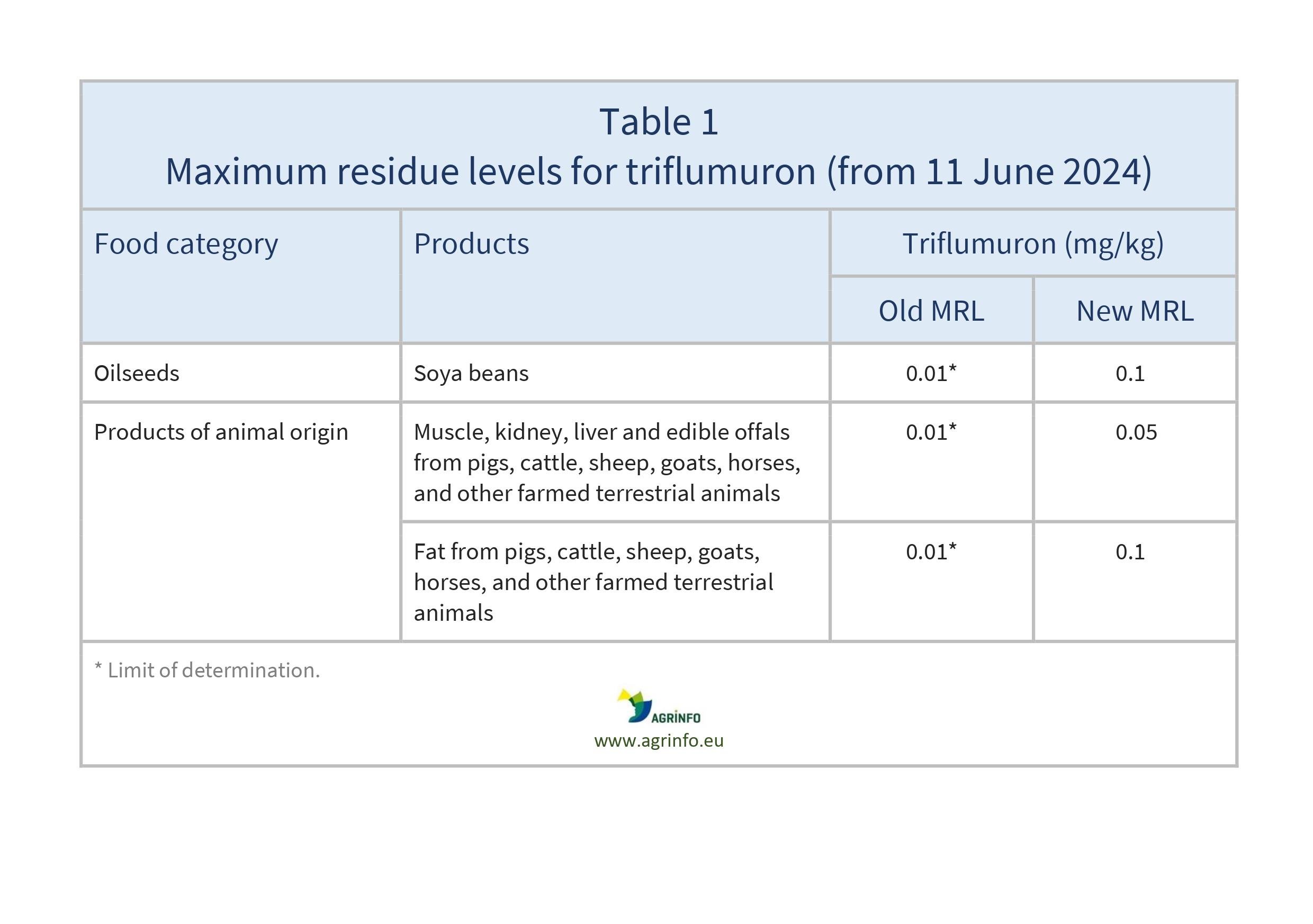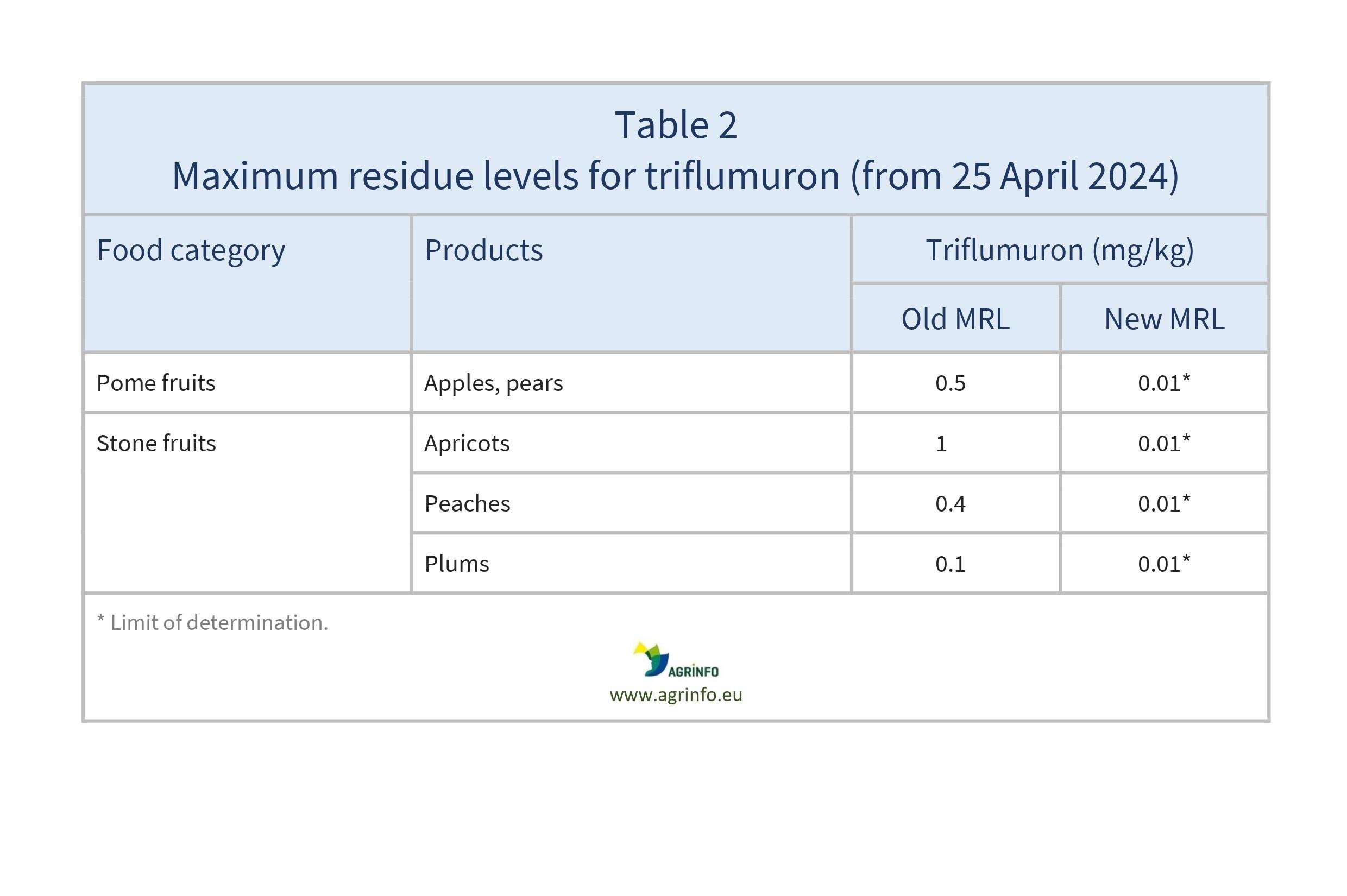Maximum residue levels for triflumuron
- Pesticide MRLs
Summary
The EU has adopted Codex maximum residue levels (CXLs) for triflumuron on animal products. This follows earlier changes to triflumuron MRLs on apples, pears, apricots, peaches, and plums that have applied since April 2024.
EU aligns MRLs for triflumuron on animal products with Codex standards
Commission Regulation (EU) 2024/1355 of 21 May 2024 amending Annexes II, III and V to Regulation (EC) No 396/2005 of the European Parliament and of the Council as regards maximum residue levels for benzovindiflupyr, chlorantraniliprole, emamectin, quinclorac, spiromesifen, and triflumuron in or on certain products
Commission Regulation (EU) 2023/2382 of 29 September 2023 amending Annexes II and V to Regulation (EC) No 396/2005 of the European Parliament and of the Council as regards maximum residue levels for carbetamide, carboxin and triflumuron in or on certain products
Update
The EU has adopted Codex maximum residue levels (CXLs) for triflumuron on animal products. This follows earlier changes to triflumuron MRLs on apples, pears, apricots, peaches, and plums that have applied since April 2024.
Impacted Products
Soyabeans, muscle, fat, liver, kidney, edible offals, apples, pears, apricots, peaches, plums
What is changing?
The changes to the MRLs for triflumuron on animal products are set out in Table 1.
The changes to triflumuron MRLs that have applied since April 2024 are shown in Table 2.
Why?
The approval of triflumuron for use in the EU expired on 31 March 2021, and no application for its renewal was submitted. As the substance is no longer authorised, all MRLs were reduced to the limit of determination (LOD, the lowest level that can be detected using the most modern and reliable analytical methods) of 0.01–0.05 mg/kg. On 2 December 2023, the Codex Alimentarius Commission adopted new Codex maximum residue limits (CXLs) for triflumuron, for which the European Food Safety Authority (EFSA) did not identify risks to consumers in the EU. The Commission has therefore concluded that the proposed modifications to the MRLs are acceptable.
Timeline
The new MRLs on animal products set out in Table 1 apply from 11 June 2024.
The MRLs for triflumuron set out in Table 2 (Regulation 2023/2382) have applied from 25 April 2024.
Recommended Actions
Suppliers to the EU market of apples, pears, apricots, peaches, and plums needed to ensure that alternative solutions were found to the existing use of triflumuron on these products by April 2024. Products exported before 25 April 2024 that comply with the old MRLs will not be removed from the EU market after 25 April, even if they are not compliant with the new MRLs.
Background
MRLs are set in accordance with the rules set out in Regulation 396/2005. For information on current MRLs for other substances, please consult the EU Pesticide Residues database.
Sources
Commission Regulation (EU) 2024/1355 as regards maximum residue levels for benzovindiflupyr, chlorantraniliprole, emamectin, quinclorac, spiromesifen, and triflumuron in or on certain products
Commission Regulation (EU) 2023/2382 as regards maximum residue levels for carbetamide, carboxin and triflumuron in or on certain products
Disclaimer: Under no circumstances shall COLEAD be liable for any loss, damage, liability or expense incurred or suffered that is claimed to have resulted from the use of information available on this website or any link to external sites. The use of the website is at the user’s sole risk and responsibility. This information platform was created and maintained with the financial support of the European Union. Its contents do not, however, reflect the views of the European Union.
EU aligns MRLs for triflumuron on animal products with Codex standards
Commission Regulation (EU) 2024/1355 as regards maximum residue levels for benzovindiflupyr, chlorantraniliprole, emamectin, quinclorac, spiromesifen, and triflumuron in or on certain products
Commission Regulation (EU) 2023/2382 as regards maximum residue levels for carbetamide, carboxin and triflumuron in or on certain products
What is changing and why?
The EU has aligned its maximum residue levels (MRLs) for triflumuron on animal products with MRLs adopted by Codex (see Table 1).
Earlier changes to the MRLs for triflumuron following its non-renewal for use in the EU are set out in Table 2.
Actions
Suppliers who sell apples, pears, apricots, peaches, and plums had to find ways to grow these crops without using triflumuron by April 2024.
Products that were shipped before 25 April 2024, and that meet the old rules for MRLs, will not be taken off the EU market after 25 April, even if they do not meet the new MRLs.
Timeline
The new MRLs for triflumuron on animal products set out in Table 1 apply from 11 June 2024.
The MRLs for triflumuron set out in Table 2 (Regulation 2023/2382) have applied from 25 April 2024.
Tables & Figures
Disclaimer: Under no circumstances shall COLEAD be liable for any loss, damage, liability or expense incurred or suffered that is claimed to have resulted from the use of information available on this website or any link to external sites. The use of the website is at the user’s sole risk and responsibility. This information platform was created and maintained with the financial support of the European Union. Its contents do not, however, reflect the views of the European Union.


